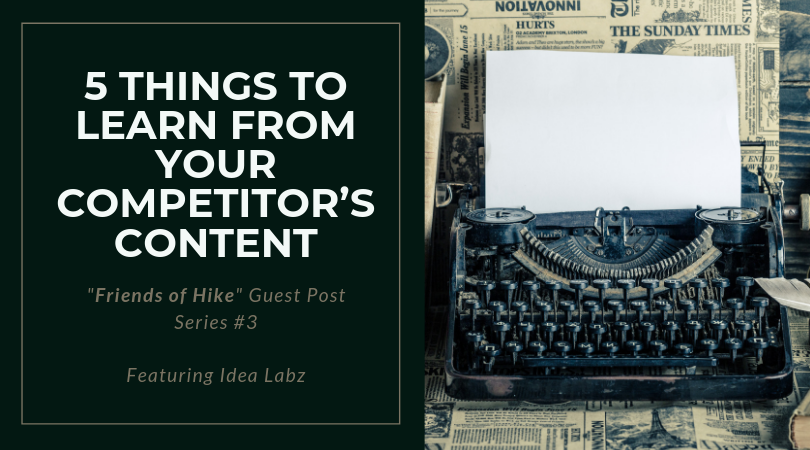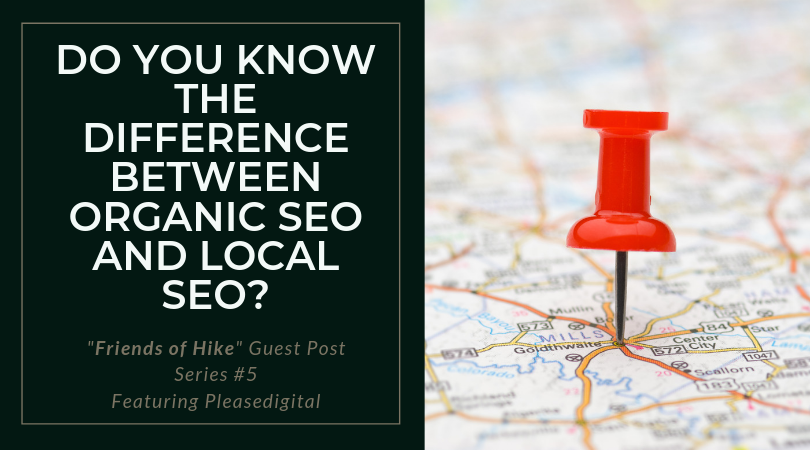Introduction from Hike – this post is the fourth in a series which we’re calling the “Friends of Hike Guest Post Series”. Being a SaaS/marketing company we have friends in lots of different companies, all who expertise in their specialist area. And we want to share their best tips – their best ‘knowledge’ – that can help YOU with your SEO. It’s all about sharing value.
It’s also to demonstrate to our users, and those small businesses/startups, that there are great opportunities for building links to your website if you participate in this ‘expertise sharing economy’. This is exactly what the future of link building looks like, and it’s what Google envisioned as the purpose of links.
Phil at it’seeze who wrote this post has included a backlink to his site. And we are HAPPY to include it, as they are providing true value to our blog and to our users.
So without further ado, enjoy the fourth guest post in this new series…

So, you think you’ve found your ideal Keywords but you’re struggling to rank for them, or perhaps not getting the traffic you need?
There’s this thing called “searcher intent” but there’s also a second step that happens if the search doesn’t return the search results they were expecting.
Find the right keywords… second time around
Imagine that someone is looking for a Web Designer local to them in Nottingham. They might fire up Google and search for a “Web Designer”, the search results will most likely return a set of Google Adverts that aren’t locally targeted, a “People also ask…” panel containing things like “What does a web designer do?” and “What qualifications do you need to be a web designer?”.
Then below all these results that they didn’t want, are the organic search results. Unfortunately, these might also mostly contain results that they weren’t looking for. Things like Web Designer job profiles, pages about building your own web page, University pages about becoming a web designer, Job listings for Web Designers.
Nothing about what they’re actually looking for!
Use Google’s autocomplete, just like your customers do
So, the searcher goes back to the search box to try again, and as they click on it, they are presented with some search predictions – they might refine their search by clicking on one of these predictions, or they might have another go at their original search. In my example, they might narrow down their search to “Web Designer Nottingham”.
Now they’ve been more specific, the search results include more web pages that are a better match for what the searcher is looking for. It’s about being visible on Google.
This searcher behaviour probably happens more than most SEO’s think, as SEO’s have a kind of black and white view of what Searcher’s do, and what keywords they should target – this view is often on based on search data, and keyword volumes, but not necessarily the refined searches that are made.
We could debate that as the 1st search that was done above will be included in the Search Volumes, this data is naturally inflated, but that’s probably for another time.
Your website might do well for high volume keyword searches, but if the results predominantly show results that aren’t relevant to what the searcher was originally looking for, they’ll give up and search again.
The Google Landscape
What I’m suggesting is that when you’re conducting keyword research and looking at your SEO, that you sit in front of Google and have a wander around the landscape that is the Google Search Results Page.
This Google landscape changes based on what you’re searching for. It’s different if you’re looking to “buy now” or just researching if it thinks we’re looking for an online resource or a physical location. If that physical location is an event – the landscape changes again. Sometimes it presents images or videos. National and regional cultural differences are even likely to make a difference to the Google landscape.
“Dallas Accountant” vs “Accountant Dallas” – two different types of results
In the example that sparked this guest blog, the Google landscape is totally different if you search for “Dallas Accountant” than it is if you search “Accountant Dallas”. Have a look, you’ll see what I mean.
And, this all changes depending on the searcher’s previous history, where they’re located compared to where you’re located, and let’s not forget that Google is not the only search engine.
There are a few excellent tools out there that will give you keyword suggestions, and allow you to look up your competitors keywords, but they need to be used with caution – there’s no magical silver bullet for SEO, and there’s little point trying to rank for keywords that aren’t appropriate for your business or trigger a Google Landscape that causes the searcher to take a second go at searching.
So, have a look at your own Google Landscape. Plug in what you think is your obvious keywords, and take a look at the results, and have a wander.
My top tips to follow…
- Are you presented with options that you think your target audience will click on?
- If the Local Pack is triggered, is your My Business Listing in there?
- If local directories are displayed, do you have a business listing in there (and, are you near the top or that directory?)?
- If there’s a “People also ask” panel – these are good keywords to write about.
- Do your competitors’ stand out more than you? Hot Tip – If they do, or if your site merges into the background amongst all the others, all saying roughly the same thing, remember that your Page Descriptions don’t actually count for SEO – so you can change your Page Descriptions to include your USPs, the things that make you different from your competition. So, in my case, rather than having a page description that merges into the background with all the other’s saying “Looking for a Web Designer in Nottingham?”, mine might say “Bespoke Designs, Fast Turnaround, Ongoing Support” – and stand out more as a result.
- If you go back to the Search Bar, what other searches could you try to match your keywords too?
- Look at the very bottom of the search page, Google will helpfully show you “Searches Related to…” which is a useful list of other search phases you might pick keywords for.
Once you’ve got these additional potential search phrases, take time to pop them into Google (and other) search engine, and have another wander…
Author bio: Phil Revill has owned and run it’seeze Nottingham for over 6 years, and has a knack of understanding what business people want and communicating in simple to understand, common sense, “normal person” language. If you value face-to-face support and want a website that works, you can find out more here – web design nottingham from it’seeze

